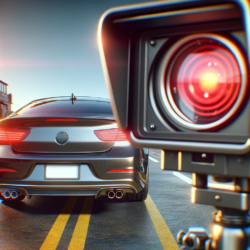Motorists in Alberta often question the legality of anti-photo radar plate covers, which are designed to obscure license plates from traffic enforcement cameras.
Let’s take a closer look at the legal framework governing these devices in Alberta.
Are Anti-Photo Radar Plate Covers Legal in Alberta?
According to Alberta’s Traffic Safety Act, license plates must be clearly visible at all times.
While the Act does not explicitly mention anti-photo radar plate covers, it implies that any device making a license plate unreadable or less visible could be considered illegal.
Calgary police have enforced this by issuing fines for obstructed license plates, which can be extended to plate covers causing glare or visibility issues.
Vehicle Equipment and Traffic Laws in Alberta
- The Traffic Safety Act sets forth regulations for vehicle equipment to ensure that vehicles on the road do not pose a safety risk or hinder law enforcement’s ability to maintain traffic laws.
- Modifications that affect the visibility of license plates can lead to fines and are discouraged to maintain the integrity of traffic enforcement.
FAQs on Anti-Photo Radar Plate Covers in Alberta
What are anti-photo radar plate covers? Anti-photo radar plate covers are devices designed to shield license plates from traffic enforcement cameras.
Are these plate covers legal in Alberta? No, these covers are considered illegal as they obstruct the clear visibility of license plates, violating Alberta’s Traffic Safety Act.
What does the Traffic Safety Act say about license plate visibility? The Act requires that license plates must be legible and clearly visible at all times, without any obstructions.
Can I receive a fine for using an anti-photo radar plate cover? Yes, using a plate cover that makes the license plate unreadable or less visible can result in a fine.
What is the penalty for having an obstructed license plate in Alberta? The fine for an obstructed license plate can be $155, as enforced by Calgary police.
Are there any legal alternatives to anti-photo radar plate covers? There are no legal devices that obscure license plates from traffic cameras; plates must remain visible according to the law.
How does law enforcement detect the use of anti-photo radar plate covers? Law enforcement officers can visually inspect license plates during traffic stops or use traffic enforcement cameras to detect visibility issues.
What should I do if I’ve been sold a vehicle with an anti-photo radar plate cover? It is advisable to remove the cover immediately to ensure compliance with the Traffic Safety Act and avoid potential fines.
Where can I find more information about vehicle equipment regulations in Alberta? Detailed information can be found in the Traffic Safety Act and the Use of Highway and Rules of the Road Regulation.
Who can I contact for more information about traffic regulations in Alberta? For further inquiries, you can contact Alberta’s Ministry of Transportation or consult with a legal professional.
Navigating Alberta’s Traffic Regulations
Motorists are advised to adhere strictly to the Traffic Safety Act’s provisions, ensuring that their vehicle equipment, including license plate visibility, complies with the law to avoid penalties.
In Summary
- Anti-photo radar plate covers that obstruct the visibility of license plates are not in line with Alberta’s Traffic Safety Act.
- Fines can be issued for using such covers, as they prevent traffic enforcement from accurately identifying vehicles.
- It is recommended that drivers ensure all vehicle modifications meet the legal requirements set by Alberta’s traffic laws.
For detailed information on vehicle regulations, visit the Alberta Traffic Safety Act and Use of Highway and Rules of the Road Regulation
(Note: This article is based on the provided instructions and available resources. It is intended for informational purposes only and does not constitute legal advice.)





